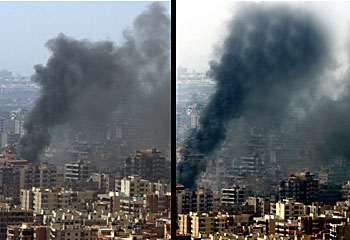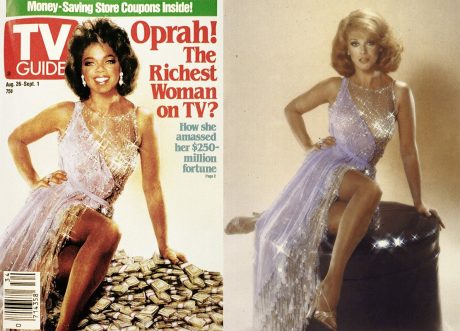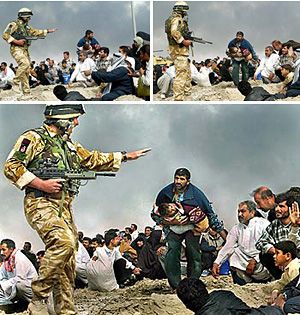A good story need not sacrifice the truth, but there are times it does. This is the case in movies. That’s a given, though. Even if done as a “historically accurate” piece, many movies sacrifice accuracy to fit ideal story elements. A completely accurate movie is almost non existent.
Perhaps in movies, we could let that go, as entertainment was barely intended to inform or educate us. When it comes to news, however, the impact is different. News is expected to report facts, so when an incident comes up where news items have compromised facts, it isn’t taken lightly.
Chasing After the “Good Photo Story”
| SUPPORT INDEPENDENT SOCIAL COMMENTARY! Subscribe to our Substack community GRP Insider to receive by email our in-depth free weekly newsletter. Opt into a paid subscription and you'll get premium insider briefs and insights from us. Subscribe to our Substack newsletter, GRP Insider! Learn more |
Let’s recall once again photographer Brian Walski. He edited photos to make it tell a better story. But in the end, it told a different story. Walski’s act has been attributed to his being tired or stressed in Iraq, but that could be interpreted by others as an excuse. It remains an industry rule that you should not change the details of a photo if you’re using it for reporting facts. Yet, like in the photo below Walski’s (by Adnan Hajj), there are a lot of people who dared defy this.

Controversial Adnan Hajj photo from 2006. Why one needs to over-dramatize a photo for news escapes me… unless it’s got a biased reason.
It also seems there are other people, especially even among vested interests, who demonstrate the same attitude as Walski of making a “good story” with the use of alterations, and do it without guilt. I’ll revisit the Inquirer photo involving Michael Siaron, photographed by Raffy Lerma in a Pieta-like style, that I called the folly of trying to make a newspaper emulate Time Magazine. But of course, that photo was done to evoke reactions rather than just stick to the facts, a method of making a “good story.” Problem is, the use of embellishment and exaggeration hints to a partisan message.
Discerning people should refuse to go by the narrative presented to them and see through the “good story.” Many times, a “bad story” will have more truth than the “good story,” as the latter can be mostly embellished, sometimes in an attempt to alter people’s view of things, or just sometimes to be “more attractive.” Thanks to the Internet (and Facebook), we have the means to bypass gatekeepers and curate information on our own. We should filter out the emotional signals and other embellishments put in the news, as well as extra-news sources.
The Role of News Organizations
This brings up another ongoing debate: are newspeople supposed to change the world? What is the role of journalism in this respect? Are they supposed to deliberately influence policy and, in a way that goes further than the “fourth estate” role, be an authority?
The agenda-setting, gatekeeping and news values theories, among many others, give the idea of such. It gives the illusion of influence. But are theories supposed to be rules? Are you supposed to change the world because some researchers simply theorized it? Also, as I have said before, newspeople are only covering things that are already happening, and should not be causing them. Isn’t that the idea of journalism, just record things and tell the truth? Don’t participate in events unless necessary (like when you’re saving a kid from a collapsing wall). News media is not supposed to influence decisions. This is why in American courtrooms, jury members are prohibited from perusing media.
Opposition to the Vietnam War was not created by the press, but was already happening in the halls of Congress. Even the My Lai massacre was to undergo an investigation by the U.S. military. And despite the story coming to public knowledge because of the press, the outcome was barely influenced by it. William Calley, considered the primary perpetrator of the massacre, though convicted, had been released after some years because a federal judge decided that he was prejudiced by pre-trial publicity. In fact, much public support was on Calley’s side, rather than against. President Richard Nixon pardoned him. So on this case, I wonder, did press publicity actually help or harm the issue?
Some people might rage against Calley’s freedom. They might want to jail him, or even kill him, or if they find out he’s a neighbor, pelt his home with vandalism and stuff (I bet social justice warriors would love to do this). They might picket in front of the house with signs that say, “apology is not enough,” or other things. But is that the right thing to do? Will it help at all? (Makes me wonder what Rappler might have written about him if they were around that time… but I digress)
The debate rages on whether, if news agencies bring something to the public, will the public really act the way the news angle expects them to? Some people may look to the news for some information, but probably do not entirely base their decisions on it. And some who decide based on them don’t affect the flow of world events. The world continues to spin on its own.
“Hero-izing” Journalists
One of the likeliest causes for overglamorizing the role of journalists is the Hutchins Commission Report of 1947. In the report, as described by Beate Josephi in the article Digital Journalism and Democracy (from the Sage Handbook of Digital Journalism), “journalists were encouraged to recognize themselves as specialists and professionals.” This likely gave the idea that journalists are a “special breed,” and defenders of democracy and freedom.
This misconception is probably what drives Rappler and its employees, and some others. They feel like heroes or “defenders of democracy” for making “exposes” or attacking a certain person, such as Marcos, Duterte or Bong Go. But what they do is nothing heroic. In fact, it may be criminal, because they come out as blackmailing or badmouthing people on basis of tsismis (gossip). Bringing someone down is not what heroes do.
When it comes to being “defenders of freedom,” the press could not claim to be the sole one or one of the most important. Even in the Josephi article I quoted, some of the press themselves opposed the Hutchins Commission’s recommendation, decrying it as “undemocratic for its elitism.” The press does not have a unique connection to democracy or freedom. Journalism is not the only use of freedom of expression. You could check to see if one press operation’s silencing might be a sign of suppression, but in doing so, you treat it as one party among many whose freedoms may or may not be at risk. And trouble with one press operation does not mean the whole industry is under threat.
We perhaps need to depart from the paradigm and journalism and democracy are linked, that if one is attacked, the other will suffer as well. Consider that journalism is functioning even in non-democratic countries (Josephi). It can be argued that the journalism and democracy paradigm is more of a fiction created by the Hutchins Commission to make journalists complacent and arrogant. Being shipped by others as an “authority” or elite does that, after all.

TV Guide’s altered photo putting Oprah’s head onto Ann-Margret’s body. A controversial cover probably meant to attract buyers with a deception.
I repeat, a good story need not sacrifice the truth, as learned from my RPN-9 experience. But if the “good story” is often sought as a tool for propagating a partisan side, then perhaps one can be satisfied with the “bad story.” If you want the truth, better drop trying to make a “good story.” Such a good story might better apply to fiction. And if you think a really peaceful world is boring to read in the news, perhaps that’s what we should desire – for the news to finally become boring.
I believe, as my cohorts here do, that what Filipinos embrace as their culture is what actually pulls the country down. And those who seem to be anti-dictators, who may also believe themselves to be “heroes,” are the real dictators.

“A picture is worth a thousand words”, they usually say. However, in this Age of computers and digital/pixel technology; pictures and photos can be altered to fit anyone’s agenda. Journalists are people. People, can be tempted by money, and are susceptible to corruption. So, we can find in news: Fake News; Altered News; Exaggerated News, News that promotes political agendas, etc. and so on.
Fortunately, we have now the Information Technology; where common and ordinary citizens, can research for the facts in the news. There is also the so called: Citizens Journalists. However, some of these citizen Journalists, are paid hacks, to give Fake News, biased opinions, exaggerated claims to promote the agendas of those whoever hired them.
So, dear readers and consumers. Use you common sense and research for the facts, to the opinions, news, claims, etc…that are coming out in the media and internet. Don’t just swallow them, hook , line and sinker. Be wise !
No people come into possession of a culture without having paid a heavy price for it.